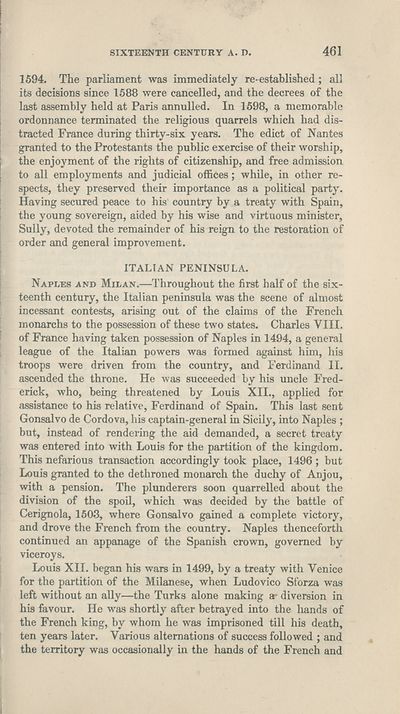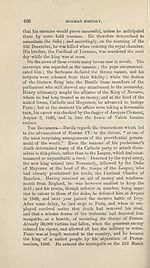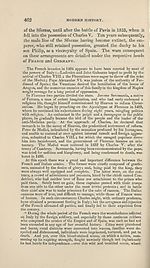Download files
Complete book:
Individual page:
Thumbnail gallery: Grid view | List view

SIXTEENTH CENTURY A. D.
461
1594. The parliament was immediately re-established; all
its decisions since 1588 were cancelled, and the decrees of the
last assembly held at Paris annulled. In 1598, a memorable
ordonnance terminated the religious quarrels which had dis¬
tracted France during thirty-six years. The edict of Nantes
granted to the Protestants the public exercise of their worship,
the enjoyment of the rights of citizenship, and free admission
to all employments and judicial offices; while, in other re¬
spects, they preserved their importance as a political party.
Having secured peace to his country by a treaty with Spain,
the young sovereign, aided by his wise and virtuous minister,
Sully, devoted the remainder of his reign to the restoration of
order and general improvement.
ITALIAN PENINSULA.
Naples and Milan.—Throughout the first half of the six-
| teenth century, the Italian peninsula was the scene of almost
incessant contests, arising out of the claims of the French
i monarchs to the possession of these two states. Charles VIII.
' of France having taken possession of Naples in 1494, a general
i league of the Italian powers was formed against him, his
| troops were driven from the country, and Ferdinand II.
I ascended the throne. He was succeeded by his uncle Fred-
i erick, who, being threatened by Louis XII., applied for
assistance to his relative, Ferdinand of Spain. This last sent
Gonsalvo de Cordova, his captain-general in Sicily, into Naples ;
| but, instead of rendering the aid demanded, a secret treaty
was entered into with Louis for the partition of the kingdom.
This nefarious transaction accordingly took place, 1496 ; but
j Louis granted to the dethroned monarch the duchy of Anjou,
[ with a pension. The plunderers soon quarrelled about the
division of the spoil, which was decided by the battle of
Cerignola, 1503, where Gonsalvo gained a complete victory,
and drove the French from the country. Naples thenceforth
continued an appanage of the Spanish crown, governed by
| viceroys.
Louis XII. began his wars in 1499, by a treaty with Venice
for the partition of the Milanese, when Ludovico Sforza was
left without an ally—the Turks alone making a- diversion in
his favour. He w-as shortly after betrayed into the hands of
the French king, by whom he wTas imprisoned till his death,
ten years later. Various alternations of success followed ; and
the territory was occasionally in the hands of the French and
461
1594. The parliament was immediately re-established; all
its decisions since 1588 were cancelled, and the decrees of the
last assembly held at Paris annulled. In 1598, a memorable
ordonnance terminated the religious quarrels which had dis¬
tracted France during thirty-six years. The edict of Nantes
granted to the Protestants the public exercise of their worship,
the enjoyment of the rights of citizenship, and free admission
to all employments and judicial offices; while, in other re¬
spects, they preserved their importance as a political party.
Having secured peace to his country by a treaty with Spain,
the young sovereign, aided by his wise and virtuous minister,
Sully, devoted the remainder of his reign to the restoration of
order and general improvement.
ITALIAN PENINSULA.
Naples and Milan.—Throughout the first half of the six-
| teenth century, the Italian peninsula was the scene of almost
incessant contests, arising out of the claims of the French
i monarchs to the possession of these two states. Charles VIII.
' of France having taken possession of Naples in 1494, a general
i league of the Italian powers was formed against him, his
| troops were driven from the country, and Ferdinand II.
I ascended the throne. He was succeeded by his uncle Fred-
i erick, who, being threatened by Louis XII., applied for
assistance to his relative, Ferdinand of Spain. This last sent
Gonsalvo de Cordova, his captain-general in Sicily, into Naples ;
| but, instead of rendering the aid demanded, a secret treaty
was entered into with Louis for the partition of the kingdom.
This nefarious transaction accordingly took place, 1496 ; but
j Louis granted to the dethroned monarch the duchy of Anjou,
[ with a pension. The plunderers soon quarrelled about the
division of the spoil, which was decided by the battle of
Cerignola, 1503, where Gonsalvo gained a complete victory,
and drove the French from the country. Naples thenceforth
continued an appanage of the Spanish crown, governed by
| viceroys.
Louis XII. began his wars in 1499, by a treaty with Venice
for the partition of the Milanese, when Ludovico Sforza was
left without an ally—the Turks alone making a- diversion in
his favour. He w-as shortly after betrayed into the hands of
the French king, by whom he wTas imprisoned till his death,
ten years later. Various alternations of success followed ; and
the territory was occasionally in the hands of the French and
Set display mode to:
![]() Universal Viewer |
Universal Viewer | ![]() Mirador |
Large image | Transcription
Mirador |
Large image | Transcription
| Antiquarian books of Scotland > Education > Elements of universal history on a new and systematic plan > (481) |
|---|
| Permanent URL | https://digital.nls.uk/127585912 |
|---|
| Description | Thousands of printed books from the Antiquarian Books of Scotland collection which dates from 1641 to the 1980s. The collection consists of 14,800 books which were published in Scotland or have a Scottish connection, e.g. through the author, printer or owner. Subjects covered include sport, education, diseases, adventure, occupations, Jacobites, politics and religion. Among the 29 languages represented are English, Gaelic, Italian, French, Russian and Swedish. |
|---|

